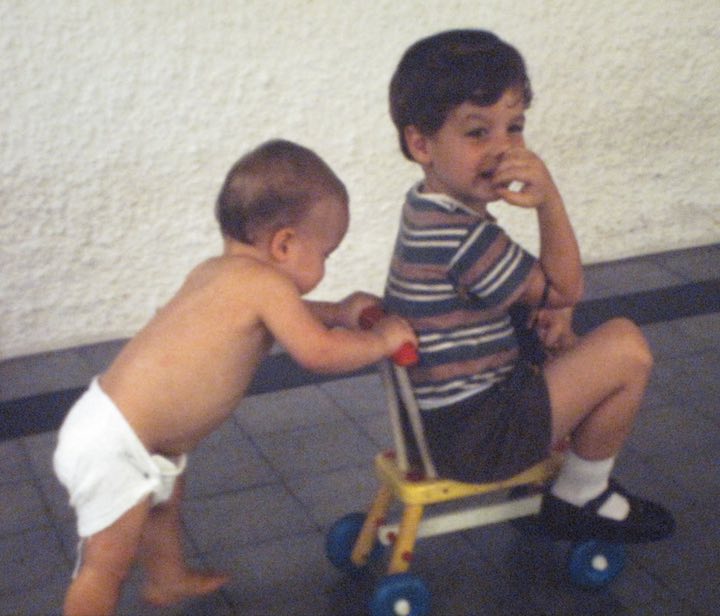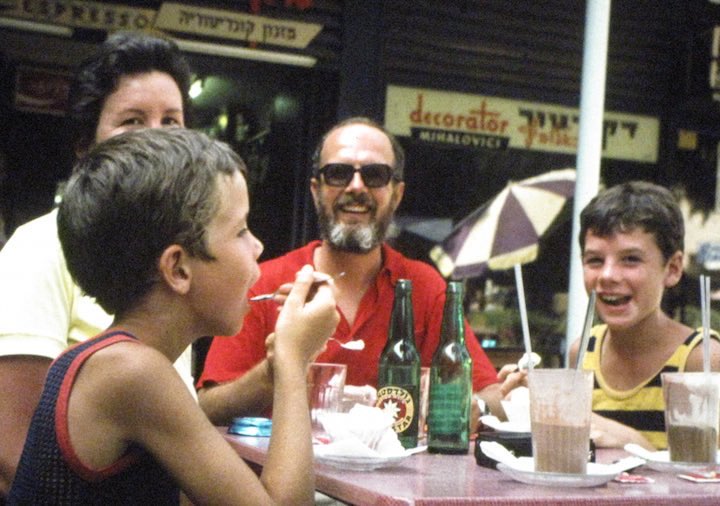My father had the most job satisfaction of anyone I have known. He had no separation between work and life. We toured factories on vacation. I visited Davidson College in North Carolina because he was consulting with a client in Charlotte before we went up to Duke and North Carolina for visits and asked the CEO what school I should visit. His grad students would call the house frequently.
Many of his best friends were colleagues. That is how I grew to know people like George Box, Brian Joiner, Soren Bisgaard and Peter Scholtes as I grew up. Various permutations of our family lived overseas based on his jobs in London (before kids), Singapore, Nigeria and China. Those experiences dramatically impacted all our lives and they were not about separating work from life.
The desire for a life embedded in other cultures and for travel drove decisions about work. He lived in Japan (because of his Dad’s job) for 2 years as a kid and that sparked his desire to do more of that as an adult.

My little brother, Justin, pushing me on a scooter at our house in Singapore.
The sensible aim is to optimize your life. Work is a big part of life. As with any system the results depend on the overall system not the performance of individual parts taken separately. Dad also died young. He was happy to have lived such a good life, even if he wished he could have lived longer he wasn’t bitter about missing anything.
When he learned he would die (of cancer) he mainly continued what he had always been doing living life and working on what he thought was worthwhile. One project he did take on, along with George Box, was creating the Center of Quality and Productivity Improvement at the University of Wisconsin-Madison. George’s speech about Dad’s work provides a nice look at how work and life – William G. Hunter: An Innovator and Catalyst for Quality Improvement.
He honestly looked back on his life and felt he had a life that few could have topped, even though it was cut short. He was certainly optimistic and positive. But my sense was this was his honest assessment, it wasn’t just some fake front he put on for others. He had been living his life as well as he could his whole life. And continuing to live it as long as he could was all he wanted to do.
I have certainly followed this vision of optimizing life myself. I don’t see life and one thing and work as something else. It is an integrated whole and if the current job creates too many negatives for the rest of life then changes are needed to optimize life.
We only have one life; the consequences of decisions and actions have long term impacts on that life. It may be you dedicate quite a bit of effort to your career for a few years at the expense of other things you would like to do based on the belief it will pay off in the long run. This is often wise. It also is often the justification used for just avoiding the issue that your actions and decisions today will impact your options and life for years and decades to come.
Most of the other people I know that are most satisfied with their lives are largely most engaged in their careers with little separation between that and their non-work life. But that isn’t always true some of them do have fairly stark separations in many ways though almost all have also a large component of their non-work life that is directly related to their career.

The family in Israel. We took the summer on the way to Nigeria traveling in the UK and East Africa and on the way back from Nigeria traveling through Israel and then Europe.
People working in software for example I find are more often happy with their lives. And even if their work and other life are fairly separate they are often pursuing learning about software, design, how people work effectively etc. outside of work.
I do also know some people that are pretty happy and basically don’t have much investment in their career. They see it as a way to fund their life. And they are happy with the job but it isn’t really that integrated with their overall life. That happens and is fine. People are different, lots of different models of optimizing life exist. For them work v. life can work to some extent but I still think it is the wrong vision. Even if work isn’t that meaningful to you, still the proper vision is the integrated whole; some people just have a more minor role for their work-life than others.
The best way to succeed is to view your entire life as a system; work is a fairly large part of that system for most people. So you need to figure out how to make the most of work within the containing system of your life. And, of course, it is a bit more complex because the containing system of your life is interacting with many other people and a few very important people. Those interactions with others (especially those closest to you) dramatically impact what options for the work portion will make the most sense for you.
Related: Work and Life (2010) – Software Process and Measurement Podcast With John Hunter – Dream More, Work Less (2008) – Vacations: Systems Thinking (2006) – Working Less: Better Lives and Less Unemployment (2012) – Curious Cat as a Celebrity in Yogyakarta, Indonesia
I don’t think “live every day as if it is your last” is a good model. Only once will that be true. Rather live everyday so as to enjoy your entire life. We seem to get so caught up in getting through each day and week that we fail to appreciate what is most important. We crowd out the important but not urgent for the urgent but not important.
So the sentiment of living everyday as if it is your last to do what is most important I agree with. Often that means doing what is important to make your life better next year and for years to come; but which if today really was you last day it would not be what you would do.
The work v. life “balance” is mainly a symptom of people that do not feel pride in their professional lives. And sadly that is a very common experience. Many of our organizations make it difficult for people to find deep contentment with their work. A better solution than seeking a “work v. life” balance is to make work more intrinsically rewarding. Trying to isolate and accept that suffering through the huge chunk of your time involved in work is going to be sacrificed for this other part of your life that you can enjoy isn’t a good solution to the problem.


“The family in Athens, Greece (I think)”
Photo was taken in Israel. Hebrew writing at the back, and Israeli Goldstar beers
Well, yes and no; nothing’s ever one way only is it? lol
I like the premise of living every day as if it’s got purpose and makes one feel good about themselves and their life. In that case, I agree with you.
On the other, I think about my dad. He was in the military 26 years and never took a vacation. When he left the military and started working for Xerox he never took a vacation… until it was forced on him as he started having health issues. Later on, he started thinking that maybe he didn’t give enough to the “life” part as it pertained to my mother and I. What we did was take a Friday as an extra day to go visit places here and there. Otherwise, it was all work for him. Once he started taking Mom on trips to different places and saw how much she liked it he wondered if he’d been fair all those years.
I learned from him in that I never took a vacation until I got married at age 37, and at this point haven’t taken a vacation since 1999; that’s probably not good either. Luckily for my wife and I, we both travel for work so we’d have no idea what to do with a vacation, but we haven’t been anywhere together in more than 10 years.
It’s something to think about when other people are involved. I tend to think that’s more of what work/life balance is supposed to be, not necessarily for ourselves.
I couldn’t agree more!
To a greater or lesser extent, work is your life. You may love it, tolerate or even hate it. But if you love work then you don’t need to cut it short. Isn’t a balance between the activities we love — not just work and the rest of life, but work and family and everything else?
I guess the questions we have to answer are: What do you love? If you’re not doing what you love every day, then why?
I really enjoyed this post, John! I have one friend who says, “I work to fund my hobbies.” She likes her work but doesn’t view it as integrated into the whole “system” (my interpretation). I respect that but I think ultimately I agree with you ….. I believe that we bring our best selves to what we love most, be it work or family life (or whatever). I am glad this piece is going to be in the Leadership Development Carnival.
Thanks for your comments everyone.
I think it is possible to focus on your overall happiness while not finding huge satisfaction from your job. It makes things more difficult because lets just say work takes about 1/2 of the time you are awake if that value is low, the other 1/2 has to be very high to get a good result.
But in some situations that is a decent option. In my experience it works best for people saying what you mentioned with a happy spirit. When they don’t really love work but can be content much of the time it can work. Sure they may also be frustrated at work a bit too (even if you love work this is usually the case sometimes) but not miserable all day long many days.
They often would see work as ok, but nothing to get excited about very often.
If it is “I hate my job” and am miserable all day but I get the weekend to be happy (which isn’t far from how some people talk) that is very hard to have fit into a good life.
And if someone neglects their life outside work that also isn’t likely to be a great result. There are a few people that live for work and the rest of life is ok but that is a small number. There do seem to be a larger number of people that escape into work (either because they are uncomfortable outside work or they have real issues they would rather escape by focusing on work). Usually neglecting part of a system doesn’t work well in the long term, it may be easier in the short term though.
Pingback: Thoughts and Musings: May 2015 | learnsigma
Pingback: Lead Change Group | June 2015 Leadership Development Carnival
Pingback: Lead Change Group | August 2015 Leadership Development Carnival
Pingback: The Road Not Taken » Curious Cat Management Improvement Blog
Pingback: Financial Independence Retire Early (FIRE) and Location Independent Working | Freelance Lifestyle, Finance and Entrepreneurship Blog
Pingback: Use FI/RE to Create a Better Life Not To Build a Nest Egg as Quickly as Possible | Freelance Lifestyle, Finance and Entrepreneurship Blog